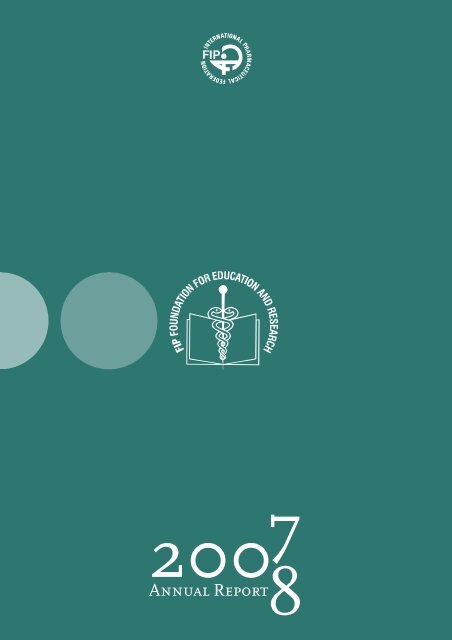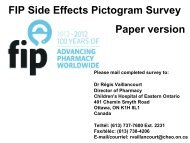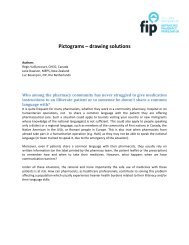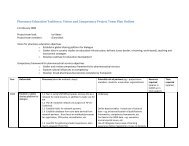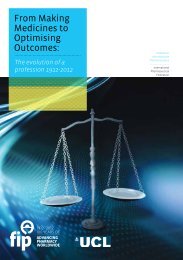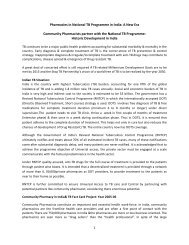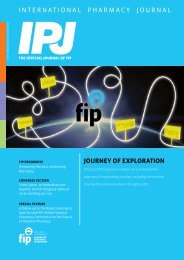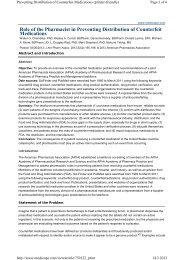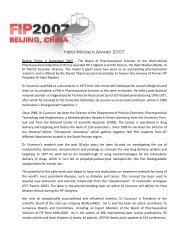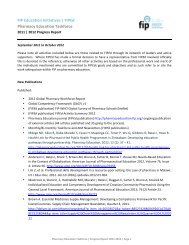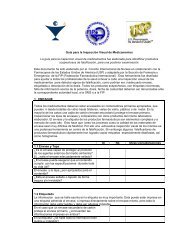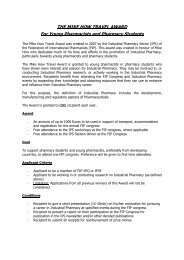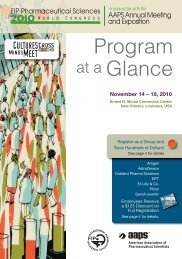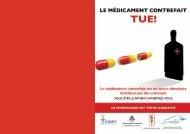Annual Report - FIP
Annual Report - FIP
Annual Report - FIP
You also want an ePaper? Increase the reach of your titles
YUMPU automatically turns print PDFs into web optimized ePapers that Google loves.
<strong>Annual</strong> <strong>Report</strong><br />
200 7<br />
8
<strong>Annual</strong> <strong>Report</strong><br />
200 7<br />
8
2<br />
<strong>Annual</strong> <strong>Report</strong><br />
200 7<br />
8<br />
Contents<br />
Year Overview...................................................................................................................3<br />
GPP - Good Pharmacy Practice Project <strong>Report</strong>.............................................................5<br />
Congress Travel Grant Award <strong>Report</strong>s...........................................................................8<br />
Medicines Information to Children and their Carers ..................................................17<br />
Foundation Supporters' Club .......................................................................................20<br />
Finance............................................................................................................................21<br />
Information ....................................................................................................................23
Objectives<br />
Year Overview<br />
The Foundation's objectives are to promote the education of and research by pharmacists and<br />
pharmaceutical scientists within the general fields of design, manufacture, distribution and use of<br />
medicines for humans and/or animals.<br />
Board of Managing Directors<br />
In 2007 two meetings were scheduled (February and September). The first meeting took place on 27<br />
February in Basel, Switzerland. The second meeting took place on 4 September in Beijing, People's<br />
Republic of China.<br />
Chairman Dr P. Kielgast, Denmark<br />
Executive Director Mr A.J.M. Hoek, The Netherlands<br />
Director Ms O. Barra, UK<br />
Director Mr T. Björk, Sweden<br />
Director Ms M.L. Hsiao, Taiwan<br />
Director Prof. H.R. Manasse, Jr., USA<br />
Director Mr M. Rouse, USA<br />
Director Dr V.P. Shah, USA<br />
As of 7 September 2007 Dr. L. Z. Benet (USA) became the new Chairman of the <strong>FIP</strong> Foundation for<br />
Education and Research.<br />
Congress Travel Grants<br />
The Foundation Board awards a limited number of Congress Travel Grants on an annual basis to enable<br />
pharmacists and/or pharmaceutical scientists to attend the <strong>FIP</strong> congress. The aim of the Congress<br />
Travel Grants is to allow recipients to travel to the <strong>FIP</strong> congress in order to develop, or to help others<br />
to develop, skills and/or knowledge in line with the objectives of the Foundation. The Executive<br />
Committees of the <strong>FIP</strong> Regional Pharmaceutical Forums will be acting as Regional Evaluation<br />
Committees. The successful grant applications will be equally spread amongst the 6 <strong>FIP</strong> Regional<br />
Forums, with a maximum of two grant winners per forum.<br />
The Foundation Board of Directors decided to grant 10 Congress travel grants in 2007. The following<br />
grant awardees were able to attend the <strong>FIP</strong> Congress in Beijing:<br />
African:<br />
Ms Jocelyn M. Chaibva, Zimbabwe<br />
Mr William Etubiebi, Nigeria<br />
3<br />
<strong>Annual</strong> <strong>Report</strong><br />
200 7<br />
8
4<br />
<strong>Annual</strong> <strong>Report</strong><br />
200 7<br />
8<br />
Americas:<br />
Mr Guido Paulo Arturo Cáceres, Argentina<br />
EuroPharm Forum:<br />
Ms Maja Ortner Hadziabdic, Croatia<br />
Ms Corina Ursu, Rep. Of Moldova (She could not attend the Congress in 2007, but will attend next year's<br />
Congress in Basel, Switzerland)<br />
South East Asia:<br />
Dr Subhash C. Mandal, India<br />
Ms Ganga Senarathna, Sri Lanka<br />
Western Pacific:<br />
Ms Dinh Thi Thanh Thuy, Vietnam<br />
Eastern Mediterranean:<br />
Ms Hagar I. Labouta, Egypt<br />
Mr Syed Shamim Raza, Pakistan<br />
In 2007, for the 14 th time, the <strong>FIP</strong> Foundation for Education and Research had a booth in the noncommercial<br />
exhibition area during the <strong>FIP</strong> annual Congress. Once again, the stand was combined with<br />
the <strong>FIP</strong> booth and proved to be a great success, especially with the help of the Board of Directors.<br />
<strong>FIP</strong> Young Pharmacist/Pharmaceutical Scientist Award for Professional Innovation<br />
This award is given on an annual basis to a young pharmacist or pharmaceutical scientist. Its aims are<br />
to promote innovation in the profession of pharmacy and pharmaceutical sciences through creative<br />
projects addressing a specific issue or problem within a field of professional practice or pharmaceutical<br />
sciences. The project's outcome should have a positive impact on the community.<br />
In 2007 the <strong>FIP</strong> Young Pharmacist/Pharmaceutical Scientist Award for Professional Innovation was<br />
awarded to:<br />
Dr Christie Robinson, USA<br />
Guidelines for the Grants and Awards Programme<br />
The Board has developed detailed Guidelines for each of the classes of Awards and Grants. These can<br />
be obtained from the Executive Director of the <strong>FIP</strong> Foundation or on the web site: www.fip.org/foundation.
GPP - Good Pharmacy<br />
Practice Project <strong>Report</strong><br />
Comprehensive pharmacy service involves activities both to secure good health and to avoid ill-health<br />
in the population. When ill-health is treated, it is necessary to assure quality in the process of using<br />
medicines in order to achieve maximum therapeutic benefit and avoid untoward side-effects 1 . The<br />
concept of collaboration between pharmacists and other healthcare professionals and pharmacists being<br />
accountable for positive patient outcomes should be at the heart of all good pharmacy practices (GPP).<br />
GPP aims to define appropriate, legal, ethical practices; strengthen regulatory control; improve access<br />
to medicines that are safe, appropriate, and cost-effective and of optimum pharmaceutical quality;<br />
ensure rational use of medicines and thus ultimately optimise patient outcomes. GPP encourages the<br />
development of standards and regulation for elements of pharmaceutical services relating to the<br />
promotion of health, supply of medicines and medical devices, patient self-care, and prescribing and<br />
medicines use. In order to implement GPP, pharmacy personnel need to be competent for practice<br />
and be supported by professional and regulatory bodies.<br />
Standards on the supply and use of medicines should be defined for elements which include medication<br />
records, competence of pharmacy personnel, storage and medicine's pharmaceutical quality, patient<br />
follow up and monitoring, formularies and treatment guidelines, assessment of drug promotion<br />
materials, reporting of adverse effects/errors/defects in medicine's pharmaceutical quality/counterfeit.<br />
Whilst GPP does not define global minimum standards of practice - these need to be developed for<br />
specific country contexts and needs - they provide a framework to guide professional and regulatory<br />
processes to enable systematic implementation. These may also lead to the set up of accreditation<br />
systems for pharmacies to ensure adherence to GPP.<br />
All practicing pharmacists are obliged to ensure that the service they provide to every patient is of an<br />
appropriate quality. Good pharmacy practice is a means of meeting that obligation. Thus, with the<br />
overall aim to improve standards and practice of drug distribution and drug utilization, using the<br />
<strong>FIP</strong>/WHO Guidelines for Good Pharmacy Practice (GPP) as the framework, the International<br />
Pharmaceutical Federation (<strong>FIP</strong>) had taken the initiative to explore the possibilities for providing<br />
technical assistance to Member Organisations in Thailand, Uruguay, Vietnam, Moldova, Mongolia,<br />
Paraguay and Cambodia in developing national standards for GPP, in a pilot study from 2005 to 2007.<br />
The pilot project is now completed and this report serves to identify key positive learning outcomes<br />
from the experience and to provide policy guidance for future projects in GPP.<br />
The <strong>FIP</strong> Bureau concluded that the GPP Pilot project was a very positive experience for those countries<br />
selected for the project implementation as well as those who were involved as observers. It brought<br />
Good Pharmacy Practice to the attention of high-level policy makers and fostered cooperation among<br />
?????<br />
1. <strong>FIP</strong> Statement on Quality of Pharmacy Services (September 1997)<br />
5<br />
200 <strong>Annual</strong> <strong>Report</strong><br />
7<br />
8
6<br />
<strong>Annual</strong> <strong>Report</strong><br />
200 7<br />
8<br />
decision makers within countries. In Thailand, a 1st Regional Conference on GPP Policy and Plans in<br />
South East Asia was organised by SEARPharm Forum and the GPP project secretariat at the Thai Food<br />
and Drug Administration, supported by WHO SEARO and WPPForum, for representatives from<br />
authorities and professional organisations in 13 countries. The first outcome of this conference was a<br />
joint initiative by the national office of WHO in India and SEARPharm Forum to organise a "National<br />
Conference on Challenges and Opportunities for Pharmacists in Health Care in India".<br />
The pilot project had also created acceptance of <strong>FIP</strong> and GPP in the host countries. <strong>FIP</strong> had been invited<br />
to lead various national pharmaceutical conferences in Paraguay, Chile, Thailand and Uruguay. Training<br />
workshops in implementing national strategies on GPP have been successfully conducted with good<br />
feedback from the participants in Denmark, Thailand, Vietnam and Uruguay. In addition to <strong>FIP</strong><br />
facilitated study tours in Denmark, Portugal and Spain, these catalysed numerous processes by which<br />
the rational use of medicines was improved so that health can be improved and/or maintained within<br />
these countries.<br />
Notably, the <strong>FIP</strong> Western Pacific Pharmaceutical Forum has been involved in supporting the writing<br />
of the new GPP statutes in Vietnam and arranging supporting education programs in the country.<br />
The GPP statutes complete the total restructure of pharmacy and the pharmaceutical industry in<br />
Vietnam, having already established new international standards for good manufacturing practice and<br />
good distribution practice. On 23rd February of 2008, the Ministry of Health issued instructions to<br />
boost the application of Good Pharmacy Practices (GPP) standards for all drugstores nationwide. Under<br />
the ministry's regulation, all drugstores of hospitals and drug companies must meet GPP standards<br />
by 2011 to remain in operation and other drugstores by 2013. By June 2008, all companies that own<br />
drugstore chains must each have at least one drugstore meeting GPP standards set by the ministry.<br />
With these positive experiences, the <strong>FIP</strong> Bureau has also made a set of recommendations for future<br />
projects of such nature.<br />
The <strong>FIP</strong> Bureau sees a role for <strong>FIP</strong>, the <strong>FIP</strong>-Foundation, the Forums and local pharmaceutical<br />
organisations to work collaboratively and synergistically with local and regional organisations to<br />
implement <strong>FIP</strong> policy, including GPP. The role of <strong>FIP</strong> in improving the rational use of medicines and<br />
improving and maintaining health could be enhanced in the following ways:<br />
? Policy development<br />
? Creating consistency, continuity and solidarity globally<br />
? Providing limited "seed grants" to support local and regional initiatives<br />
? Providing expertise when needed as a catalyst for implementation at the local and regional level<br />
? Providing an opportunity for education, training, and networking at the <strong>FIP</strong> Congresses<br />
? Raising the importance of policy issues to financing agents such as WHO and the World Bank<br />
Local and regional organisations also have a role in improving the rational use of medicines by working<br />
with <strong>FIP</strong> to implement <strong>FIP</strong> policy including GPP. This collaboration can have advantages such as:<br />
? Lower costs when programmes are coordinated and implemented within local and regional<br />
organizations;
? Interest, responsiveness to the local situation, ownership and sustainability are more likely if policy<br />
implementation occurs at the local and regional level;<br />
? Changes in practice require changes in attitude that also must come from local and regional<br />
leadership over a long period of time.<br />
In conclusion, the technical support <strong>FIP</strong> has provided in this three year pilot project has enhanced the<br />
progress of the implementation of WHO/<strong>FIP</strong> policies and guidelines on good pharmacy practice. It<br />
is a firm belief that the project countries are committed to continuing these efforts, however the speed<br />
of the process and the results strongly depend on the availability of international networking and<br />
support 2 .<br />
?????<br />
2. <strong>FIP</strong> report on Technical assistance to the implementation of WHO/<strong>FIP</strong> Guidelines on Good Pharmacy Practice<br />
in countries with developing economies (August 2007)<br />
7<br />
200 <strong>Annual</strong> <strong>Report</strong><br />
7<br />
8
8<br />
<strong>Annual</strong> <strong>Report</strong><br />
200 7<br />
8<br />
Congress Travel Grant<br />
Award <strong>Report</strong>s<br />
<strong>Report</strong> on participation at 67th International Congress of <strong>FIP</strong>, Beijing, China 2007<br />
By<br />
Hagar Ibrahim, Alexandria, Egypt<br />
2007 <strong>FIP</strong> Congress Travel Grant Awardee<br />
My name is Hagar Ibrahim. I work as a lecturer assistant at the Faculty of Pharmacy, University of<br />
Alexandria, Egypt. I was one of the recipients of <strong>FIP</strong> travel grants for attending the 67 th International<br />
Congress of <strong>FIP</strong> at Beijing, China 2007.<br />
I was really impressed by the outstanding scientific climate and the friendly environment during the<br />
congress days. The sessions were given by well-recognized speakers. Some of these sessions were<br />
relevant to my area of specialization, for instance, the talk on the regulations and the specifications for<br />
in vitro testing of novel dosage forms by Dr Cynthia Brown, a research-based talk on lipid-based<br />
formulations for enhancing the solubility of poorly soluble drugs by Dr Chris Porter, Dr Pauletti's talk<br />
on the use of nanocarriers for gene delivery, "industrial nanomanufacturing of drug delivery systems"<br />
by Dr Kawashima, the talk by Dr Zhang Qiang from University of Beijing on nanoparticulate formulations<br />
and others. This was of outmost importance in terms of valuable information, latest pharmaceutical<br />
trends through the presentations and through answering questions, asked by me or by other participants,<br />
which they highly encouraged and responded to. The congress was also a chance for direct contact with<br />
these great scientists, to benefit from their experience and meet other young researchers from all around<br />
the globe and explore some ideas with them. The congress has also allowed me to make good friends<br />
like Dr Sandra Klein from University of Frankfurt, Germany and Dr Cheng Tong working at Pfizer<br />
at the USA.<br />
Besides this, I presented part of my work completed during my master program as an oral presentation<br />
in the industrial pharmacy section of the congress. The presentation was entitled "Verapamil hydrochloride<br />
microspheres for potential topical applications" and it was acknowledged by the present professors,<br />
scholars and colleagues. This was a great experience for me knowing that this was the first time for<br />
me to give a podium presentation in a conference.<br />
Moreover, there was also a room to attend sessions of other sections especially the session on "The use<br />
of informatics to improve medication safety" which included very interesting and interactive talks.<br />
Finally, attending the congress has achieved my objectives in terms of valuable and updated scientific<br />
information, building relationships with others and enhancing my personal development. The experience<br />
gained through attending such a successful congress will positively affect my research work aiming<br />
for influencing pharmaceutical industry at my home country, Egypt. This will also allow me to take<br />
more active role in my society through passing the experience and knowledge I got to my colleagues
and to the undergraduate students, encouraging them to attend international congresses such as the<br />
<strong>FIP</strong>.<br />
Such a great experience wouldn't have become possible if not for the travel grant from the <strong>FIP</strong> foundation.<br />
These grants are of outmost importance for young researchers like me in the developing countries. For<br />
that, I would like to thank the <strong>FIP</strong> for giving me the chance to present my work and enhance my skills<br />
and knowledge, with <strong>FIP</strong> financial assistance, at the 67 th International Congress of <strong>FIP</strong>.<br />
<strong>Report</strong> on participation at 67th International Congress of <strong>FIP</strong>, Beijing, China 2007<br />
By<br />
Dr. Subhash C. Mandal, M.Pharm., Ph.D (Pharm.), India<br />
2007 <strong>FIP</strong> Congress Travel Grant Awardee<br />
It is my proud privilege to report that I have attended the World Congress of Pharmacy and Pharmaceutical<br />
Sciences 67 th International Congress of <strong>FIP</strong> held at Beijing, China during 31 st August - 6 th September<br />
2007 and presented a paper. This was possible due to the Travel Grant offered to me by the <strong>FIP</strong><br />
Foundation for Education and Research.<br />
I have presented a paper in the poster session of Pharmacoepidemiology / Pharmacoeconomics entitled<br />
"Study on trends of drug use by private practitioners in a town in India and its impact on treatment<br />
cost" which was appreciated by the participants.<br />
Pharmacists are essential participants of the health care team and the field of drugs and pharmaceuticals<br />
who can work in this area to reach medicines of proper quality, proper amount, at proper time for<br />
different clinical conditions to the general mass. My presentation is a humble contribution to the global<br />
research to reach medicines to the underprivileged.<br />
An exhibition was organized during 3 rd - 6 th September 2007. Several exhibitors participated from different<br />
countries around the globe. It was revealed that China has an integrated system of health care system,<br />
which was reported by the exhibitors of Chinese manufacturers of both modern and traditional systems<br />
of medicine. Some exhibitors displayed their products like-Transdermal Patch, which involves highest<br />
modern technology, whereas some have displayed products of traditional system of medicines. A trend<br />
is interesting, which is that they are continuously modernizing their TCM based on scientific approach.<br />
It was worthy to visit that State Food & Drugs Administration (SFDA) of People's Republic of China<br />
exhibited mobile Laboratories having modern facilities including HPLC, IR spectrophotometer. They<br />
reported that they go to remote places of the country and test drug samples on the spot to check<br />
counterfeit drugs. Three hundred and fifty three Mobile Labs were deployed by SFDA in 28 provinces<br />
during February 2006 to August 2007. This measure reflected results in checking counterfeit medicines<br />
and is extremely appreciable.<br />
Outcome:<br />
1. This occasion gave an opportunity to know a large number of facets of the pharmacy profession. I<br />
came to know the actual status of Pharmacy Practice throughout the globe, which has helped me<br />
to realize how to take suitable measures for the development of community pharmacy of our country<br />
in proper direction.<br />
9<br />
<strong>Annual</strong> <strong>Report</strong><br />
200 7<br />
8
10<br />
<strong>Annual</strong> <strong>Report</strong><br />
200 7<br />
8<br />
2. During the six days, I have attended several sessions including GMP, Validation, GCP, Regulatory<br />
affairs, Biotechnology, Clinical research, Community pharmacy, Individualised Medicines etc.,<br />
which have enriched my knowledge and understanding in these areas - which have to be dealt with<br />
during our day-to-day work.<br />
3. This knowledge could be inculcated amongst our colleagues for overall improvement of working<br />
environment of the directorate.<br />
4. My presentation is a humble contribution to the global research to reach medicines to the<br />
underprivileged.<br />
Finally I wish to keep on record that <strong>FIP</strong> Foundation for Education and Research is an excellent initiative,<br />
which can help a Pharmacist/Pharmaceutical Scientist to avail this opportunity so that they can serve<br />
the profession more efficiently, by attending such conferences, getting to know about the types of<br />
research activities and applied sciences in the pharmaceutical technology sphere through interaction<br />
with participants.<br />
<strong>Report</strong> on participation at 67th International Congress of <strong>FIP</strong>, Beijing, China 2007<br />
By<br />
SMDK Ganga Senarathna<br />
2007 <strong>FIP</strong> Congress Travel Grant Awardee<br />
I attended the 67 th <strong>FIP</strong> congress with the hope of achieving two objectives 1) To enhance my knowledge<br />
in the field of Academic Pharmacy and 2) To expand my knowledge in evidence based selection of<br />
medicines, pharmacoepidemiology and pharmacoeconomics.<br />
The 67 th <strong>FIP</strong> congress was equipped with four sessions from Academic Pharmacy section. I attended<br />
all academic pharmacy sessions, two administrative pharmacy sessions and one of pharmacy information<br />
session. I found all the sessions very rewarding.<br />
The session on "Life-long learning and continuing professional development: we have all heard the<br />
theory, what is the evidence?" had three very informative presentations. The presentations were focused<br />
to address the issues related to Continuous Education (CE) and Continuous Professional Development<br />
(CPD) programs and highlighted the difference between the CE and CPD and why it should be CPD<br />
rather than CE. Dr Jennifer Marriot's presentation highlighted certain barriers in conducting CPD<br />
programs and Ms Jennifer Archer's presentation was thought provoking as it pointed out that we might<br />
be conducting CE assuming that it is CPD.<br />
The Pharmaceutical Society of Sri Lanka (PSSL) is conducting a CPD program for the pharmacists in<br />
Sri Lanka even though CPD is not mandatory for practicing pharmacists in Sri Lanka. After this exposure<br />
I joined the sub-committee for CPD at the PSSL, so the knowledge obtained through this session could<br />
be implemented which would help the PSSL to conduct CPD programs more effectively.<br />
The session on "Experiential learning - bridging classroom education and pharmacy practice" was a<br />
totally new concept to me. This session again was very informative and helped us to understand the<br />
importance of experiential learning and the merits of it. At present in my University we have a curriculum<br />
for B.Pharm. course with zero credits for experiential learning and it is not a compulsory requirement.
Having participated in this session, I learned the potential gains of experiential learning and the value<br />
it could add to the pharmacy education. It was also very interesting to listen to Dr Marriot again and<br />
to find out the university courses available to educate trainers of trainee/preceptor education. Mr Mike<br />
Rouse's presentation showed the weight that the US accreditation body has given to experiential learning.<br />
This session proved to me that we have a long way to go both in terms of preceptors and incorporation<br />
of experiential learning into the curriculum. It would be my obligation to suggest incorporation of<br />
experiential learning as a part of the curriculum when the time comes for a curriculum revision and<br />
to identify proper preceptor for educating students. I would acknowledge the <strong>FIP</strong> foundation for<br />
Education and Research for giving me an opportunity to contribute for curriculum revision.<br />
The session on "Evidence based practice and complementary medicine: teaching and learning by<br />
example" helped me to achieve a major part of my second objective. The two speakers, Ms Kristie<br />
Galbraith and Mr Greg Duncan did a wonderful job of showing how we can answer a clinical question<br />
after critical appraisal of literature. The speakers were very clear on the tools and strategies for searching<br />
the literature and it was interesting to know that a slightly outdated Cochrane review can give an<br />
unsatisfactory answer to the clinical question. The session was useful and it would definitely help me<br />
in future for evidence based selection of medicine and be an evidence based pharmacy practitioner.<br />
The session on "Medication reviews - beyond medication counseling towards service delivery" was an<br />
eye opener to see the services which can be extended at the community pharmacy level. The presentation<br />
by Ms Lea Tuomainen was interesting and it was good to get to know that there are university courses<br />
conducted purely on how to conduct medication reviews for community pharmacists.<br />
To my disappointment, the interest group of the pharmacoepidemiology and pharmacoeconomics did<br />
not meet. However I managed to meet Professor Alan Lyles, Professor Marina Altagracia Martinez and<br />
Professor Albert I. Wertheimer who are also resourced persons in the area of pharmacoeconomics and<br />
discussed some of my research questions with them. It was nice of Professor Martinez for offering to<br />
help me in the future in my pharmacoeconomic studies and I am now in contact with her.<br />
The poster sessions also were very rewarding. I presented a poster and acknowledged <strong>FIP</strong> foundation<br />
for Education and Research.<br />
I attended the first timer's reception and got exposed to different sections of the <strong>FIP</strong> foundation and<br />
now I plan to be a member of Academic Pharmacy and Pharmacy Information sections. I also came<br />
to know the activities and benefits of the International Pharmaceutical Students' Federation (IPSF).<br />
Now I am in the process of trying to make our students members of the IPSF.<br />
The congress also allowed me to get to know pharmacists from South East Asia Region and now I can<br />
have better collaboration with them.<br />
The welcome reception at the Great Peoples Hall was an event for a life time. I attended receptions by<br />
the president and by the Chinese Pharmaceutical Association. Further we managed to visit the Great<br />
Wall, Forbidden City and Tiananmen Square and it was a memorable experience.<br />
All in all, attending the 67th <strong>FIP</strong> congress was a life time experience to me. I gained knowledge,<br />
exposure and I met resourced person from all around the world.<br />
11<br />
200 <strong>Annual</strong> <strong>Report</strong><br />
7<br />
8
12<br />
200 <strong>Annual</strong> <strong>Report</strong><br />
7<br />
8<br />
I shared my experiences with my fellow academic pharmacists, council members of the PSSL and with<br />
our students. I have acknowledged the <strong>FIP</strong> foundation for Education and Research in all these instances.<br />
I wrote to the Faculty Board in the Faculty of Medical Sciences, University of Sri Jaywardenepura and<br />
included in my progress report to the Research and Higher Degree Committee of Faculty of Medicine,<br />
University of Colombo and acknowledged the receipt of the travel grant from the <strong>FIP</strong> foundation for<br />
Education and research.<br />
Finally I am extremely grateful to the <strong>FIP</strong> foundation for Education and Research for giving me the<br />
privilege as one of the recipient of the 2007 <strong>FIP</strong> travel grant to China. I would have never been there<br />
without your generous funding.<br />
I do pledge that the knowledge and the experience I gained will be used to improve the profession of<br />
Pharmacy in Sri Lanka.<br />
<strong>Report</strong> on participation at 67th International Congress of <strong>FIP</strong>, Beijing, China 2007<br />
By<br />
Syed Shamim Raza, Pakistan<br />
2007 <strong>FIP</strong> Congress Travel Grant Awardee<br />
Attending the International Congresses organized by <strong>FIP</strong> every year is a unique learning experience<br />
for me. The Beijing conference was my third <strong>FIP</strong> conference and my second as a <strong>FIP</strong> Foundation travel<br />
scholarship recipient (the first was Sydney, 2003). Traveling to Beijing was more than a pure scientific<br />
and professional experience for me. Besides achieving most of my expected learning objectives, I met<br />
some renowned researchers, professionals and academics. It was also fascinating to attend the opening<br />
ceremony held at the Great People's Hall and also attend the Goodbye Dinner at the Great Wall, one<br />
of the world's wonders.<br />
On Sunday, September 2 from 0900 - 1230 I attended the forum for innovators in pharmacy practice.<br />
Alison Roberts from the University of Sydney was impressive; the Danish experience was also good.<br />
I also attended the <strong>FIP</strong>/IPSF Students' day, with the theme of social dimensions of developing the pharmacy<br />
profession. My friend Billy Futter of Rhodess University was superb and Tana Wuliji was also impressive.<br />
Overall it was an exceptionally well attended and good program.<br />
At night I enjoyed the welcome party held at courtyard of Jiuhua Spa & Resort Hotel. The food was<br />
good and music band was awesome. The party ended late night with lots of fun and dance, the<br />
atmosphere was really informal and people were mingling around with each other. I met with Indian<br />
and some South Africans friends.<br />
On September 04 I attended session on clinical trials in Asia organized by <strong>FIP</strong> Hospital Pharmacy<br />
Section and <strong>FIP</strong> Industrial Pharmacy Section. It was a very good learning experience for me as I am<br />
looking after the clinical trials in my department and am also a member of my hospital ERC/IRB. In<br />
the afternoon I attended the session held on services and benefits that pharmacists are offering to<br />
society and describing the value of pharmacists. The theme of the program was Is there enough evidence<br />
for the value of pharmacists? Attending the session I learnt that in developing countries like Pakistan
we have to raise the bar, as here the whole pharmacy profession is in infancy and we need to capitalize<br />
on services which save lives and money of patients through pharmacists' interventions.<br />
The 5th September was the busiest day for me right from its beginning until the end as I placed my<br />
poster in the poster area then I attended the session co-sponsored by WHO on technical, scientific and<br />
evidence-based information resources about medicines. I returned to the poster area to find lots of<br />
participants asking questions regarding my work and my hospital. They were amazed to know the<br />
services which we are providing to Pakistani people and were impressed to know that my hospital<br />
received JCIA accreditation - the first hospital in Pakistan to have this international accreditation.<br />
I also went to visit the Chinese hospital and in the afternoon and attended short oral presentations<br />
arranged by the IP community pharmacy section.<br />
On the same day I went to attend Hospital Pharmacy Section dinner at Summer Palace Beijing it was<br />
really beautiful to watch and dine on traditional Chinese cuisines<br />
Medication errors are no doubt an issue in my daily professional life and before hearing John Santell<br />
from United States Pharmacopeia, USA, I had never appreciated the role of a regulatory agency in<br />
preventing them. Mr. Nick Barber's presentation was also good and highlighted issues in lieu of patient<br />
safety, particularly in the context of hospital pharmacy. I must give credit to <strong>FIP</strong> on arranging a session<br />
on the use of informatics to improve medication safety. My suggestion is to include more in terms of<br />
patient safety in coming the Basel or Istanbul conferences as far as look-alike and sound-alike medications<br />
errors and role of regulatory bodies.<br />
At the Goodbye Dinner Party at the Great Wall I was a full of adrenaline when I found myself in front<br />
of a gigantic and impressive piece of architecture and one of the greatest wonders of the world and a<br />
UNESCO world heritage site. I climbed to the top with other participants and got a certificate on top<br />
that proved that I CLIMBED GREAT WALL ON SEP 06, 2007.<br />
Learning Objectives Achieved:<br />
It is very hard to summarize what I had gained from this congress; however I would like to mention<br />
following objectives that I had achieved:<br />
? I presented my research to the rest of the world to seek their comments, criticism, suggestions and<br />
directions for my future research.<br />
? I gained international exposure and met some of the most senior academics and professionals.<br />
? I learnt some of the useful ways of delivering pharmaceutical services, especially pharmacist's<br />
participation in chronic medical illnesses so that I can create some innovations in my own settings.<br />
? I learnt the way we should present our research, analyze papers, how to criticize any research and<br />
how to tackle questions in an efficient manner.<br />
13<br />
200 <strong>Annual</strong> <strong>Report</strong><br />
7<br />
8
14<br />
200 <strong>Annual</strong> <strong>Report</strong><br />
7<br />
8<br />
? I am extremely motivated to participate in national and international research related to pharmacy<br />
practice and exchange contact information with those who have similar interests as me.<br />
? In short, I would like to say that I had gained a lot in terms of professional competence, selfconfidence,<br />
and vision of future and training of fellow pharmacist to further enhance my professional<br />
capabilities.<br />
I would like to thank <strong>FIP</strong> Foundation for this travel Scholarship thus making it possible for me to attend<br />
the International event of Pharmacy.<br />
<strong>Report</strong> on participation at 67th International Congress of <strong>FIP</strong>, Beijing, China 2007<br />
By<br />
Jocelyn Chaibva, Zimbabwe<br />
2007 <strong>FIP</strong> Congress Travel Grant Awardee<br />
I felt greatly honoured and humbled to be awarded the <strong>FIP</strong> Travel grant for 2007, which enabled me<br />
to travel to Beijing China, for the 2007 <strong>FIP</strong> Congress.<br />
At this Congress, I met many pharmacists from different countries and learnt from their experiences<br />
based on the presentations from the various speakers. The conference presents an opportunity for<br />
pharmacy education in the various areas of pharmacy practice. This was a great learning experience<br />
which is an asset to pharmacy practice in my country of Zimbabwe.<br />
Sessions attended:<br />
During the Congress I attended the following presentations:<br />
Community pharmacy<br />
The responsibility of the community pharmacist to support adherence - How is it done?<br />
This becomes quite tricky in a busy community pharmacy with say, one pharmacist. Within the short<br />
time available, the pharmacist should be able to give simple, yet very important information. This becomes<br />
quite important in the use of steroids, inhalers and in the management of hypertension and diabetes.<br />
Industrial Pharmacy<br />
I attended a workshop on Industrial Pharmacy to familiarize myself with this area of pharmacy practice.<br />
After the Congress in China, we have invited pharmacists in industry to present papers on generic<br />
manufacturing to members of the Pharmaceutical Society of Zimbabwe. The use of generic medicines<br />
is an important topic in resource-limited settings like ours, and good manufacturing practice has to<br />
be maintained.<br />
Academic Section<br />
The symposium on Life Long Learning and Continuing Professional Development was very interesting for<br />
me. I could identify with the issues raised and benefited from the presentations. The barriers to<br />
pharmacists taking CPD are also faced in Zimbabwe. The introduction of CE/CPD as prerequisite for
enewal of practicing certificate found a large number of pharmacists joining the Pharmaceutical Society<br />
of Zimbabwe, which is the main provider of CE for pharmacists. I noted from the presentations that<br />
there is a need for accreditation of CPD providers, so as to ensure that the education provided is relevant<br />
to the profession. Treatment regimes and protocols have been changing over the years, hence the need<br />
for life long learning and CPD.<br />
Counterfeit medicines<br />
This an area which is the subject of campaign programs in various countries. On World Health Day<br />
2007, the Pharmaceutical Society of Zimbabwe participated in a public awareness campaign on the<br />
dangers of unregistered medicines which are obtained from flea markets and other unregistered<br />
premises. It was interesting to note that various stakeholders are working really hard to minimize the<br />
distribution of counterfeit medicines in the various countries.<br />
<strong>FIP</strong> Pharmacy Information<br />
Reducing antimicrobial resistance is a very pertinent topic which highlighted the need for correct medication<br />
intake. It highlights the results of poor adherence to ARV regimes, which would result in serious drug<br />
resistance and high treatment failure. Second-line treatment becomes unaffordable, especially in<br />
resource-limited settings.<br />
Medication errors recording systems is another area which was of interest to me. Errors can originate<br />
from the doctor, pharmacist or the patient. The need for adequate labeling and effective communication<br />
can not be over-emphasized. This also highlights the need for empowering the patient 'correctly',<br />
especially where online information is concerned, and also the role of the pharmacist in minimizing<br />
the risk of improper medicine use. It has been noted from certain research that the proportion of<br />
medicine errors can be as high 40%!<br />
The campaign on adherence code named "Only the Medicine You Take Will Help" highlights the need<br />
for patient education on adherence, and the role of pharmacists in patient education. This can also be<br />
used as a theme for Pharmacy Day.<br />
African Pharmaceutical Forum<br />
I attended the session of the APF whose objective is to promote pharmacy services is the African region.<br />
I noted that as a region we have not been very active. The forum managed to produce malaria fact cards<br />
and bilharzia fact cards which are tools which can be used for public campaign against malaria and<br />
bilharzia respectively.<br />
I was unable to attend the session on migration of pharmacists, which I know is a serious problem in<br />
my country. The session was held before my arrival in Beijing. I noted from the reports that the problem<br />
is not limited to developing countries only, but is a global issue. In Zimbabwe, there is a School of<br />
Pharmacy with an output on an annual basis. Despite this output, the number of pharmacists in the<br />
public sector is very small, resulting in the use of non-pharmacists doing the pharmacist job in our<br />
public institutions. The Health Ministry is looking at ways of retaining pharmacist in the public sector<br />
in order to strengthen the provision of good pharmaceutical services in the country.<br />
Acknowledgement<br />
My most sincere gratitude goes to the <strong>FIP</strong> Foundation for affording me an opportunity of a lifetime.<br />
I attended the <strong>FIP</strong> Congress for the first time, after which I then joined <strong>FIP</strong> as an individual member.<br />
15<br />
200 <strong>Annual</strong> <strong>Report</strong><br />
7<br />
8
16<br />
200 <strong>Annual</strong> <strong>Report</strong><br />
7<br />
8<br />
I look forward to attending future <strong>FIP</strong> Congresses, in Basel in 2008 and Turkey in 2009. The Congress<br />
in Beijing China was worth attending. Thanks to <strong>FIP</strong> Education and Research Foundation for making<br />
it possible for me to attend <strong>FIP</strong> Congress 2007<br />
2007 Travel Grant Award Winner Jocelyn Chaibva at the Registration Area in Beijing
Medicines<br />
Information to<br />
Children and<br />
their Carers<br />
The recipient of the 2006 Young Pharmacists Professional Innovation award was Dr Rebekah Moles<br />
from Australia.<br />
Rebekah was awarded 1000 Euros to commence a project to develop medication education packages<br />
for children and their carers. Below is an update of the ongoing research which was seeded by the <strong>FIP</strong><br />
innovation award.<br />
Background<br />
Use of medicines in children is high. The Australian National Health Survey indicates that 42% of<br />
children under 15 used medications within a two week period prior to survey (National Health survey<br />
2004-5). Previous studies indicate that problems in medicating children are common (Sepponen et al.<br />
2002, Kairuz et al. 2007), however more information is needed on the nature and extent of the problems<br />
of medicine use in children in general. Further, to be able to use medicines correctly, parents need<br />
information. There are numerous sources of information, the reliability of which greatly vary. Pharmacists<br />
are an underused source of reliable and easily reachable information. Research shows that the most<br />
important health information sources for children are parents, especially the mother (Chambers et al.<br />
1997, Menacker et al. 1999, Hämeen-Anttila et al. 2005). However, there are no studies on what<br />
information sources parents use when medicating their children, and furthermore, how they evaluate<br />
the reliability of this information. There is also a lack of knowledge on attitudes of parents when<br />
medicating their children.<br />
Aims of the study<br />
The aim of this research is to explore current trends in children's medicine use.<br />
More specifically, the objectives are to explore:<br />
? how common medicine use is among children under 15 years<br />
? what medicines are commonly used<br />
? for which illnesses and symptoms children use OTC-medicines and prescription medicines<br />
? what kind of problems parents face when medicating their children<br />
? what sources parents use in finding information about medicines<br />
17<br />
200 <strong>Annual</strong> <strong>Report</strong><br />
7<br />
8
18<br />
200 <strong>Annual</strong> <strong>Report</strong><br />
7<br />
8<br />
? what kind of perceptions and attitudes parents have about medicines<br />
? how parents' own medicine use and attitudes influence children's medicine use<br />
? from which sources parents search for information concerning child's medicine use<br />
? which information sources are considered reliable by parents<br />
Materials and methods<br />
The study progresses in three phases<br />
1) Pilot study (PHASE ONE)<br />
The Children's medicine use questionnaire (CMUQ), developed in Finland was pilot tested among<br />
Australian parents. The questionnaire was translated from Finnish to English then back-translated to<br />
ensure semantic equivalence of the English questionnaire to the Finnish version. A total of 153<br />
parents/main caregiver of a child aged 0-15 years were recruited via convenience sampling. Construct<br />
validity of the attitudinal section of the CMQ was performed using exploratory factor analysis. To test<br />
the reliability of statements contained in the instrument, the internal consistency was assessed using<br />
Cronbach's alpha coefficient.<br />
2) Focus groups (PHASE TWO)<br />
Focus group discussions (FGD) with parents of different aged children under 15 years were conducted.<br />
Three focus groups were conducted to explore participants' attitudes towards medicating children and<br />
to triangulate quantitative data.<br />
3) National survey (PHASE THREE)<br />
This phase will use the validated instrument to survey a national sample. This data will inform the<br />
design of education packages for children and their carers.<br />
Results (Phase 1 and 2)<br />
Factor analysis generated a parsimonious four factor solution explaining 50% of variance in the data.<br />
The four subscales representing the four factor solution each returned a Cronbach's Alpha coefficient<br />
> 0.6, indicating good internal consistency. Participants in focus groups were satisfied with the structure<br />
and content of the questionnaire. There were five themes that emerged from focus groups regarding<br />
the perception of medicines use in children. These included: concerns about the negative effects of<br />
medicines, the necessity of prescription medicines for treating illness, the sufficiency of the body's<br />
natural process in fighting illness, the efficacy of over-the-counter medicines, and the use of alternative<br />
medicines in children. Interestingly, most themes discussed in the focus groups were reflected in the<br />
factor solutions.<br />
Implications for further studies and pharmacy practice<br />
The findings of this study to date have shown that the CMQ is a valid and reliable instrument. Small
changes have been made based on focus group feedback and the CMUQ is currently being re-piloted<br />
prior to the national study. The data collected will be used for developing targeted medicine related<br />
educative materials for parents and children. Similar methodology is planned to be used in other<br />
countries. If comparisons across countries show similar results then education packages can be developed<br />
for use in several different settings.<br />
Conclusion<br />
This research is an exciting area where pharmacists have an integral role in supporting children's and<br />
their carer's medication and health education needs. This preliminary exploration into parental views<br />
of medication related issues is an essential first step in order to develop specific and targeted educational<br />
materials for pharmacists and other professionals to use in the future.<br />
19<br />
200 <strong>Annual</strong> <strong>Report</strong><br />
7<br />
8
20<br />
<strong>Annual</strong> <strong>Report</strong><br />
200 7<br />
8<br />
Foundation<br />
Supporters' Club<br />
Donations and other forms of sponsorship are an essential component in the success of the Awards<br />
Programme and the <strong>FIP</strong> Foundation.<br />
The Foundation has established a series of benefits, both individual and corporate, in order to attract<br />
potential donors/sponsors. Six categories have been installed:<br />
? Ribbon - 25 Euros<br />
? Bronze - 250 Euros<br />
? Silver - 251 – 1,000 Euros<br />
? Gold - 1,001 – 5,000 Euros<br />
? Platinum - 5,001 – 25,000 Euros<br />
? Diamond - 25,001 Euros and more<br />
We would like to highlight the Gold and Diamond categories.<br />
Gold Category:<br />
Dr J.A. Oddis, USA<br />
Prof. K. K. Midha, Canada<br />
Platinum Category:<br />
--<br />
Diamond Category:<br />
Taiwan Society of Health Systems Pharmacists, China Taiwan<br />
The members of the bronze and silver category have received a letter of appreciation after the <strong>FIP</strong><br />
Congress, whereas the members of the Gold, Platinum and Diamond categories will be receiving a<br />
certificate of merit and will be personally acknowledged during the Council dinner, which is held at<br />
the <strong>FIP</strong> World Congress of Pharmacy and Pharmaceutical Sciences in Basel, Switzerland.
ASSETS<br />
Finance<br />
Statement of Income and Expenditure<br />
for the Year Ended December 31 st, 2007<br />
(Expressed in EUR)<br />
2007 2006<br />
Financial fixed assets<br />
Bonds 1 64 688 75 000<br />
Current assets<br />
Prepayments and accrued income 1 2 651 2 471<br />
Cash and Bank 1 333 137 377 278<br />
Total current assets 335 788 379 749<br />
Total assets 400 476 454 749<br />
CAPITAL AND RESERVES AND LIABILITIES<br />
Capital and reserves 345 701 356 976<br />
Allocated funds for future projects 2 30 213 50 508<br />
375 914 397 112<br />
Current account <strong>FIP</strong> 21 000 35 483<br />
Liabilities grants 3 1 000 1 250<br />
Other liabilities 3 2 562 20 904<br />
Total current liabilities 24 562 57 637<br />
Total capital and reserves and liabilities 400 476 454 749<br />
21<br />
<strong>Annual</strong> <strong>Report</strong><br />
200 7<br />
8
22<br />
<strong>Annual</strong> <strong>Report</strong><br />
200 7<br />
8<br />
INCOME<br />
Statement of Income and Expenditure<br />
for the Year Ended December 31 st, 2007<br />
(Expressed in EUR)<br />
2007 2006<br />
Donations 4 49 360 121 459<br />
Development Grant <strong>FIP</strong> 25 000 5 000<br />
TOTAL INCOME 74 360 126 459<br />
EXPENSES<br />
Grants 5 20 900 23 380<br />
Operational costs 6 9 449 9 588<br />
Costs allocated funds 6 65 107 136 993<br />
TOTAL EXPENSES 95 456 169 961<br />
OPERATING RESULT 21 096 43 502<br />
Interest 7 102 9 606<br />
FINANCIAL RESULT 102 9 606<br />
NET RESULT BEFORE APPROPRIATION 21 198 33 896<br />
APPROPRIATION OF THE RESULT, (FROM)/TO:<br />
Allocated funds 20 295 23 524<br />
<strong>FIP</strong> Foundation Capital 903 10 372<br />
TOTAL APPROPRIATED 21 198 33 896
Information<br />
For a copy of the guidelines and/or for further information, please contact the <strong>FIP</strong> Foundation for<br />
Education and Research, P.O. Box 84200, 2508 AE The Hague, The Netherlands. Telephone number:<br />
+31 70 302 1970 or +31 70 302 1971; fax number: +31 70 302 1999 or E-mail: foundation@fip.org.<br />
23<br />
200 <strong>Annual</strong> <strong>Report</strong><br />
7<br />
8
24<br />
<strong>Annual</strong> <strong>Report</strong><br />
200 7<br />
8
<strong>FIP</strong> Foundation for Education and Research<br />
Street Address:<br />
Andries Bickerweg 5<br />
2517 JP The Hague<br />
The Netherlands<br />
Mailing address:<br />
P.O. Box 84200<br />
2508 AE The Hague<br />
The Netherlands<br />
Tel.: +31-70-3021970 · Fax: +31-70-3021999<br />
E-mail: foundation@fip.org


